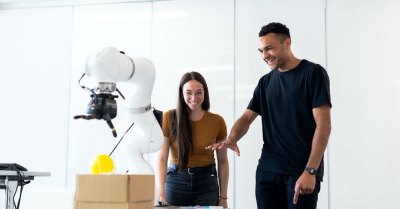
Economic Opportunities
May 2 2024

An ambitious research project is aiming to help expand the roles that robots can play in assisting humans in manufacturing and distribution processes.
The €7 million Dynamic Agile Production Robots That Learn and Optimise Knowledge and Operations (DARKO) project will harness the latest innovations in robotics and involve partners from Sweden, Germany, Italy and Switzerland, alongside experts from the University of Lincoln and Bosch, a leading global supplier of technology and research.
Robotic technology is already utilised effectively in some manufacturing sectors for picking and packing tasks, but this research aims to introduce a new function of ‘throwing’ in order to increase energy efficiency and speed up some of the most time-consuming processes.
A robotic arm will be developed to throw non-breakable objects such as plastic pipes and components into containers ready for distribution, with testing taking place at ARENA2036, a high-profile research demonstration area in Germany.
The Lincoln team, led by Dr Nicola Bellotto, Associate Professor in the Lincoln School of Computer Science, will be responsible for developing the spatial awareness capability needed for the robots to work safely and efficiently alongside humans in a busy warehouse setting.
Dr Bellotto said:
These robots will work autonomously without the need for human supervision. However, they will encounter people while going about their duties and so will need to learn to understand human intentions in order to share space safely.
As humans, when we encounter a group of people in a narrow corridor, we instinctively know how to navigate the situation safely. We are able to pick up on human intentions and subtle communications of mutual agreement and this is what we are aiming to develop in these robots.
Professor Andrew Hunter, Deputy Vice-Chancellor for Research and Innovation, said:
At the University of Lincoln, our academics work at the forefront of their fields on research that supports industry and makes a tangible difference to society, including in robotics and logistics.
Led by world-leading experts from the Lincoln Centre for Autonomous Systems, this project has the potential to revolutionise the future of a whole host of logistics processes.
The project team, which also includes University of Lincoln Professor of Intelligent Robotics and Interactive Systems Marc Hanheide as Co-Investigator, is recruiting a postdoctoral researcher and PhD student to work alongside them on this exciting research.
Professor Hanheide also leads the Lincoln team in the ‘ILIAD’ project working with European partners from academia and industry to develop flexible intralogistics services for the food distribution sector – the success of which will be built upon by the ‘DARKO’ project team.

Economic Opportunities
May 2 2024

Latest News
May 1 2024
This week the Government has launched Help to Grow: Management Essentials, a new, free, bite-sized online course to help small businesses grow.
Read more
Green Growth
May 1 2024
Michelin Development is helping a Stoke-on-Trent cleaning product company launch a new venture, which has already created additional jobs in the city.
Read more